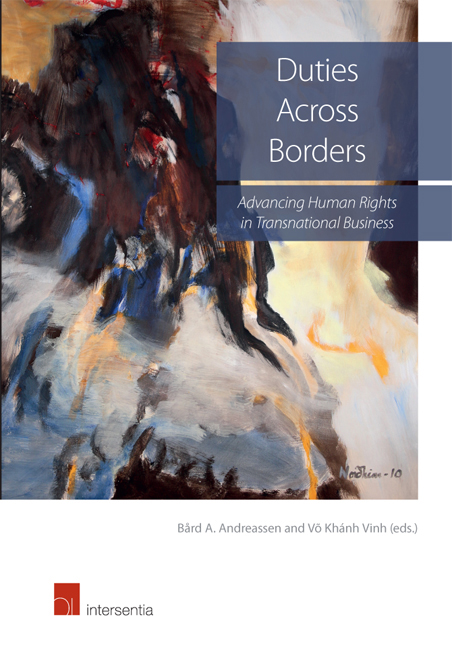Book contents
- Frontmatter
- Preface
- Contents
- List of Authors
- List of Figures and Tables
- Introduction. Business’ Duties Across Borders: The New Human Rights Frontier
- Part I. Conceptual Developments
- Chapter 1 Business and Human Rights, or the Business of Human Rights. Critical Reflections on Emerging Themes
- Chapter 2 Corporate Liability for Human Rights. Effective Remedies or Ineffective Placebos
- Chapter 3 Ensuring the Protection of the Environment from Serious Damage. Towards a Model of Shared Responsibility between International Corporations and the States Concerned?
- Chapter 4 The Business Case for Taking Human Rights Obligations Seriously
- Chapter 5 Corporate Accountability in the Field of Human Rights. On Soft Law Standards and the Use of Extraterritorial Measures
- Chapter 6 The Viability of the Maastricht Principles in Advancing Socio-Economic Rights in Developing Countries
- Part II Contextual Issues
- Part III Sites Of Regulation
Chapter 3 - Ensuring the Protection of the Environment from Serious Damage. Towards a Model of Shared Responsibility between International Corporations and the States Concerned?
from Part I. Conceptual Developments
Published online by Cambridge University Press: 21 September 2018
- Frontmatter
- Preface
- Contents
- List of Authors
- List of Figures and Tables
- Introduction. Business’ Duties Across Borders: The New Human Rights Frontier
- Part I. Conceptual Developments
- Chapter 1 Business and Human Rights, or the Business of Human Rights. Critical Reflections on Emerging Themes
- Chapter 2 Corporate Liability for Human Rights. Effective Remedies or Ineffective Placebos
- Chapter 3 Ensuring the Protection of the Environment from Serious Damage. Towards a Model of Shared Responsibility between International Corporations and the States Concerned?
- Chapter 4 The Business Case for Taking Human Rights Obligations Seriously
- Chapter 5 Corporate Accountability in the Field of Human Rights. On Soft Law Standards and the Use of Extraterritorial Measures
- Chapter 6 The Viability of the Maastricht Principles in Advancing Socio-Economic Rights in Developing Countries
- Part II Contextual Issues
- Part III Sites Of Regulation
Summary
INTRODUCTION
This chapter focuses on the issue of legal responsibility of multinational corporations for serious environmental damage caused by economic activity which represents a heightened risk of causing widespread, long-term and severe harm to the environment, namely oil pollution in the form of large oil spills and nuclear accidents in terms of ensuring nuclear safety and controlling nuclear waste management. The term ‘serious environmental damage’ is used to denote a threshold of environmental damage considered ‘significant’, ‘serious’, or above ‘tolerable levels’ in different relevant international instruments. Different terms, as ‘international corporations’, ‘transnational corporations’, ‘companies’, ‘business enterprises’ and ‘multinational enterprises’, are used interchangeably in relevant international instruments and literature, as well as in this chapter. Here the term describes companies whose economic activity takes place in two or more states and whose area of activity involves risk of causing serious environmental damage through oil pollution or nuclear contamination.
The environment is under considerable pressure from the economic activity of large and small international corporations, which eventually results in the gradual degradation of the landscape and ecosystems. The International Court of Justice (ICJ) has defined the environment as ‘the living space, the quality of life and the very health of human beings, including generations unborn.’ It has been aptly noted that most threats to the environment are attributable to the activities of private entities operating on a state's territory. Environmental damage has generally been defined to include four possible elements: (1) fauna, flora, soil, water and climatic factors; (2) material assets (including archaeological and cultural heritage); (3) the landscape and environmental amenity; and (4) the interrelationship between the above factors. The work of the United Nations Compensation Commission (UNCC) has had important implications for the recognition of: (1) ‘pure’ ecological loss; (2) temporary loss of resource use; (3) loss valuation by modelling; and (4) compensation for irreparable loss. In that sense, the regime of compensation for serious environmental damage has made considerable progress. Notably, environmental damage caused by oil pollution and nuclear accidents, which is the focus of this chapter, triggers a regime of strict liability under international law.
Generally, economic activity takes a considerable toll on the environment, leading to its degradation over time.
- Type
- Chapter
- Information
- Duties Across BordersAdvancing Human Rights in Transnational Business, pp. 67 - 90Publisher: IntersentiaPrint publication year: 2016

